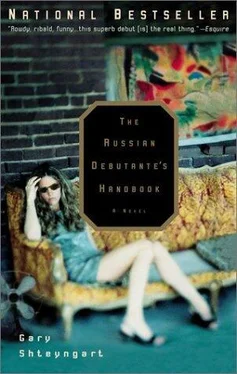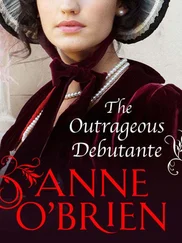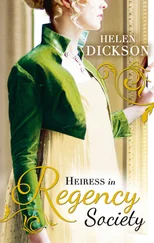Gary Shteyngart - The Russian Debutante's Handbook
Здесь есть возможность читать онлайн «Gary Shteyngart - The Russian Debutante's Handbook» весь текст электронной книги совершенно бесплатно (целиком полную версию без сокращений). В некоторых случаях можно слушать аудио, скачать через торрент в формате fb2 и присутствует краткое содержание. Город: New York, Год выпуска: 2003, ISBN: 2003, Издательство: Riverhead Books, Жанр: Современная проза, Юмористическая проза, на английском языке. Описание произведения, (предисловие) а так же отзывы посетителей доступны на портале библиотеки ЛибКат.
- Название:The Russian Debutante's Handbook
- Автор:
- Издательство:Riverhead Books
- Жанр:
- Год:2003
- Город:New York
- ISBN:0-7865-4177-6
- Рейтинг книги:4 / 5. Голосов: 1
-
Избранное:Добавить в избранное
- Отзывы:
-
Ваша оценка:
- 80
- 1
- 2
- 3
- 4
- 5
The Russian Debutante's Handbook: краткое содержание, описание и аннотация
Предлагаем к чтению аннотацию, описание, краткое содержание или предисловие (зависит от того, что написал сам автор книги «The Russian Debutante's Handbook»). Если вы не нашли необходимую информацию о книге — напишите в комментариях, мы постараемся отыскать её.
and
. The Russian Debutante’s Handbook Bursting with wit, humor, and rare insight,
is both a highly imaginative romp and a serious exploration of what it means to be an immigrant in America.
The Russian Debutante's Handbook — читать онлайн бесплатно полную книгу (весь текст) целиком
Ниже представлен текст книги, разбитый по страницам. Система сохранения места последней прочитанной страницы, позволяет с удобством читать онлайн бесплатно книгу «The Russian Debutante's Handbook», без необходимости каждый раз заново искать на чём Вы остановились. Поставьте закладку, и сможете в любой момент перейти на страницу, на которой закончили чтение.
Интервал:
Закладка:
Now, Cohen had had intimations of this self-hate business before. He was named Perry, after all. On high holy days, the only times when his father would take Perry into faraway St. Louis for services, he would make a habit of referring to the rabbi as Reverend Lubofsky. “Hope the Reverend lays off the Gipper this year,” he’d say, crumpling his big, sad, fleshy-lipped face in frightened anticipation of any Iowa local seeing them pull into the little synagogue’s parking lot.
And so Cohen found himself at the progressive Midwestern liberal arts college (a sister institution to the one Vladimir attended), a college where communal father-hatred was the norm, and where Cohen excelled particularly. In the early nineties the school also served as a kind of way station for hundreds of unhappy Midwestern young men and women on their way to the redemptive land of Prava. Cohen, angry and confused, took the cue by junior year. And here he was.
SO THAT WAShis story! That was Cohen’s theme! His father was a rich asshole. How shocking. Vladimir was ready to attack Cohen with his own background, from the Jew-baiting of Leningrad to his years as a Stinky Russian Bear in Westchester. Assimilation, my ass. What do you know of assimilation, spoiled American pig? Why, I’ll show you… I’ll show you all!
Oh, and the way Cohen had told the story. Lowering his voice during the bit about the Gipper, trying to sound hurt but brave when recalling his father’s transgressions. Crocodile tears, my suburban friend. Your father could be a deforester of forests and a murderer of Hutus, but in the end what determines your fate is the size of your trust fund, the slope of your nose, the quality of your accent. At least his daddy wasn’t accusing him of walking like a Jew. God damn it! Vladimir could just kill this Cohen! But instead he shook his head mournfully and said, “My God. It’s hard to believe such things can still happen in this day and age.”
“I can’t believe it either,” said Cohen. “I hope you don’t mind me sharing it with you.” My sharing it with you, Vladimir mentally corrected him (idiot Americans didn’t even know their own language). And no, as long as there was hard currency down the road, he did not mind.
“My relationship with my father is something that really informs my work,” Cohen continued. “And I thought you’re the kind of person…”
Oh? What kind of person was he?
“You seem very wise and world-weary.”
“Ah,” Vladimir said. Wise and world-weary. Well he got that right, the son of a bitch. But then the supercilious Girshkin softened a little. Come to think of it, wise and world-weary was possibly the kindest thing you can say to a twenty-five-year-old. And then the Iowan was, as we have said, a big, attractive fella, a grungy lion (if only Vladimir could look more like him), confident enough of himself to share his intimacies over the course of a single beer. Plus, he had nice, heavy rural hands, the hands of a man, and had probably slept with all kinds of women. Vladimir, too, had designs on manhood, and to that end, Vladimir wanted to be Cohen’s friend. The need for friendship and closeness was not something Vladimir imagined would rekindle so soon after his ignominious flight from the States, but it was certainly there; Vladimir was still a social animal with the need to rub up against fellow creatures. And he had before him this lion. This goofy wandering beast.
Cohen finished by asking Vladimir if he could see his mother poem. “It’s not ready yet,” Vladimir said. “I’m sorry.”
A long silence followed his apology. Cohen may have felt rebuffed after his own fifteen minutes of candor. But soon the pit-barbecued pork arrived and the waitress cleared her throat to remind them that they had a waitress.
“Oh, you never told me what your company develops,” Cohen said finally.
“Talent,” Vladimir said. “We develop talent.”
VLADIMIR AND COHENwalked off the pork as the sun prepared for its bedtime swoon into the river. Over the Emanuel Bridge they went to the tune of buskers playing saxophones behind Bata shoe boxes lined with velvet; a blind accordion player and his wife belting out German beer-hall songs with great aplomb and to the jingle of the largest coins; a rendition of Hamlet by a pair of peppy young California blondes drawing stares and whistles from young Stolovan men but little coinage from their embarrassed conationals. With all this low-tech commerce and entertainment, the bridge felt to Vladimir like the oldest crossing imaginable, a stone carpet unfurled from the castle overhanging the scene like a one-piece skyline. It was lined on both sides with statues of saints, grimy with coal dust and contorted into heroic positions. “Look,” Cohen said, pointing out three indistinct figures lost in the robes of two of the grander saints. “That’s the devil, that’s a Turk, and that’s a Jew.”
Ah, so we were back to Cohen’s grand theme again. Vladimir tried to put together a smile. He was feeling happy and pleased with himself after their lunch, but knew that his mood was malleable under the depressant weight of alcohol and didn’t want the tragic curve of history to put him in a state. “Why are they underneath the saints?” he asked out of obligation.
“They’re supporting them,” Cohen said. “They’re the support team.”
Vladimir didn’t want to press it further. It was some sort of medieval humor, but what did those stalwarts of Christendom know, with their earth flat and reason always falling off the edges? This was 1993, after all, and with the exception of the nascent slaughter in the Balkans, the African Horn, the ex-Soviet periphery, and of course the usual carnage in Afghanistan, Burma, Guatemala, the West Bank, Belfast, and Monrovia, the world was a sensible place.
“Now I’m going to take you to my favorite place in this city,” Cohen said. And then, without warning, the restless man broke into a power walk, so that momentarily they quit the Emanuel Bridge and gained the embankment. Navigating past the churches, the mansions, and the singular powder tower that had chosen to decamp on this side of the Tavlata, they ran into a cozy lane, which ascended the city’s heights alongside the castle. Here, squat merchant’s mansions were marked by mosaics of ancient occupations and family quirks: three tiny violins, a goose fat from centuries of inertia, an unhappy-looking frog. Vladimir was on the lookout for a gherkin; perhaps his family had had a Prava past as well.
It was a struggle maintaining his pace up the hill. The pollution was deadly; life itself seemed to reek of coal. Cohen, however, was making good time, although now that his friend wasn’t seated, Vladimir noticed that he carried a heavier-than-average load at the bottom, and his thighs, too, had benefited from the city’s pork masterpieces.
Cohen ducked into a lane even more narrow than the last, which soon exhausted itself into what could no longer be termed a lane, rather a confluence of the pastel backsides of four buildings. He seated himself on one of a series of steps leading to a phantom doorway that had long become a wall, and told Vladimir that this particular skylit cubicle was the most special corner of Perry Cohen’s Personal Prava. This was where he came to write his columns and poems for one of the town’s English papers, the woefully misnamed Prava-dence.
So this was Cohen’s special place? They had run up and down the four hills of Prava for this? While the rest of the city (minus the Foot) was an endless stretch of panoramic vistas, Cohen had chosen the tightest, most prosaic corner of Eastern Europe… Why, Vladimir’s panelak had more character. Wait a second. Vladimir took another look. He must learn to think like Cohen. This was the key. A century ago he had taught himself to think like Francesca and her urban-god friends. Now he must adapt once more. What makes this place special to Cohen? Look closely. Think like Cohen. He likes this place because…
Читать дальшеИнтервал:
Закладка:
Похожие книги на «The Russian Debutante's Handbook»
Представляем Вашему вниманию похожие книги на «The Russian Debutante's Handbook» списком для выбора. Мы отобрали схожую по названию и смыслу литературу в надежде предоставить читателям больше вариантов отыскать новые, интересные, ещё непрочитанные произведения.
Обсуждение, отзывы о книге «The Russian Debutante's Handbook» и просто собственные мнения читателей. Оставьте ваши комментарии, напишите, что Вы думаете о произведении, его смысле или главных героях. Укажите что конкретно понравилось, а что нет, и почему Вы так считаете.












